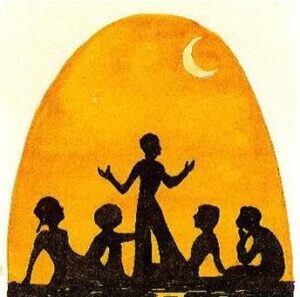Image from Medfield, MA public library, wallaceshealy-com-OPvCP3-clipart
The Power of Retelling
Rabbi Jane Rachel Litman
A few weeks ago, I was invited to speak to a university class about being one of the first generation of women and queer rabbis. At these kinds of talks, I usually tell mostly the same stories – of how a guy trying to pick me up on a ski lift actually fell off when I told him I was studying to be a rabbi, of how one professor made the small group of women students sit in the back, of how one member of my admission committee called me privately at 2am to discuss being bisexual, of how it was more than five years after ordination that I was first asked to officiate at a funeral, though many Jews were willing to ask a “woman rabbi” to officiate at a wedding or baby naming. The students gasp, laugh, fidget uneasily. In one generation I have gone from being a complete oddity: “I’ve never met a women rabbi before!” to being commonplace. The students simply do not have the life experience to fully take in the stories. Yet they listen carefully and ask thoughtful questions. Seniors hold the power of history.
Self Curation
Devarim has been called “the first midrash” because in many ways it is an interpretation rather than a repetition of Exodus. It is set 38 years after the previous Torah portion[1]. Moses, the remaining elder–at least a generation older than Joshua and Caleb, and many years senior to the mass of young people he addresses–is recounting history. According to the Torah, we readers have jumped in time. We engaged the story of Exodus as it unfolded. Now we are contemporaneous with Moses as he retells the story that we alone–of all those present in the retelling–lived with him. Creating and disseminating a narrative is a complex process. What will he say to the young people surrounding him?
Retelling can be a form a self-empowerment. We rarely have the opportunity to selectively edit as we are actually experiencing living, but in retelling we give ourselves choices and possibilities. Over time, we also become the outsider to our own earlier lives, finding perspective, disengagement, and perhaps even acceptance.
Sometimes people are questioned about their personal past or pressured to discuss their communal history. This is particularly true for marginalized groups like Jews or BIPOC (Black Indigenous People of Color) or LGBTQ people. We are called upon to justify our existence or teach about our “exotic” life experience. In mindful construction of our narrative, we resist this forced exposure, and become the center rather than the margin. We normalize our own sense of the meaning of existence. As elders, like Moses, we not only recount our personal stories, but also have the ability to reconstruct and promulgate the communal past.
Trans-Mission
Retelling is not a neutral act. It is a form of education. It has a moral arc. What will Moses include? What will he leave out? What teachings and tales will help the next generation make their world a better place? What will give them support and inspiration for the road ahead? What are some cautionary tales to help them avoid errors and mistakes?
Moses begins by recounting the source of his authority, God (explicitly the God of Abraham, Isaac and Jacob), and God’s accomplishments: the defeat of many enemies, and a miraculous revelation at Horeb. Moses continues with the group mission, for the younger generation to inhabit the promised land of Israel. Then he provides some wisdom about group management, including delegating authority and leadership development based on merit. He emphasizes some tribal values such as impartial justice and equity for non-Jews.
Now comes the heart of this parashah and Moses’ teaching. Moses retells in detail the story of why all the older generation are gone; a cautionary tale of hardships that ends in triumph. The retelling is compelling with its tragic losses and joyous victories. It includes convincing realistic touches such as King Og’s iron bedstead[2] (which is so interesting that Spinoza comments upon it at length many centuries later). Finally, Moses concludes with the charge to enter Israel, “Do not fear, because Adonai your God will battle for you.”
This speech provides a good model for elders explaining history to a younger generation. It is careful, concise, moving, detailed and educational. It has a beginning that locates it in relation to the listeners, a middle filled with adventures, and an uplifting ending.
Slippage
Postmodernist theorists Jacques Derrida and Jacques Lacan explore the idea of the relationship between the tale and the teller. Derrida notes that there is always “slippage” in any construction of a narrative between the event and its narration. Lacan suggests that ignoring the slippage and creating a (false) continuity is the foundation for human sanity.
It’s a good thing that Moses never met Derrida or Lacan because the Book of Devarim is filled with slippage. Some laws that appear there are entirely new, having no parallel in Exodus or other parts of the Torah (e.g., the law of the king, the law of the captive woman, and many others). Moses teaches us that as elders we not only curate and construct narratives through making choices about including/excluding information from the past, but by adding helpful extraneous material as well.
Until Parashat Devarim, the Torah unfolds almost entirely in its present. Devarim begins a different, in many ways more rabbinic, process of storytelling. In it, Moses seeks to weave together a past, present and future, to create a heritage for the next generation. This narrative construction eventually becomes a hallmark of the Sages, and the foundation for Judaism.
So, when I’m interviewed by a grad student doing research on Jewish feminism or gender identity or queer theory, usually I tell the same stories about meeting challenges, finding allies, and overcoming obstacles. And every so often I choose a story that illustrates how to deal with challenges relevant to the moment, such as organizing over 30 years ago to support staff at abortion clinics who were being targeted and harassed. Because seniors, like Moses, own history, and that is our legacy.
[1] Masei, Num. 33:1-36:13
[2] Deut. 3:11
Rabbi Jane Rachel Litman staffs the Jewish Roundtable at the Center for LGBTQ and Gender Studies in Religion (CLGS) at the Pacific School of Religion in Berkeley CA. Jane also works as a hospice rabbi. Jane’s latest publication LIBERATING GENDER FOR JEWS AND ALLIES (Cambridge Scholars Press) just came out in paperback.











0 Comments